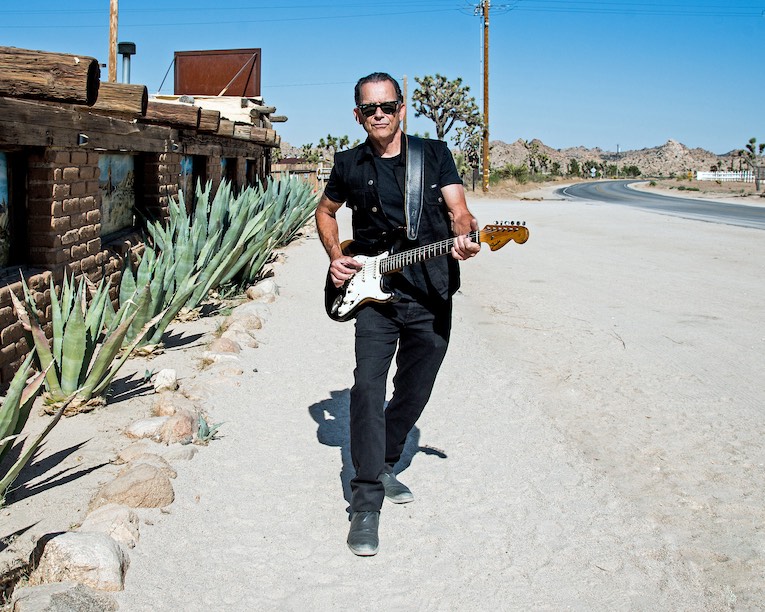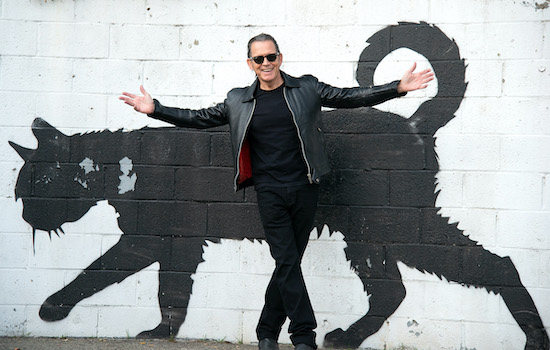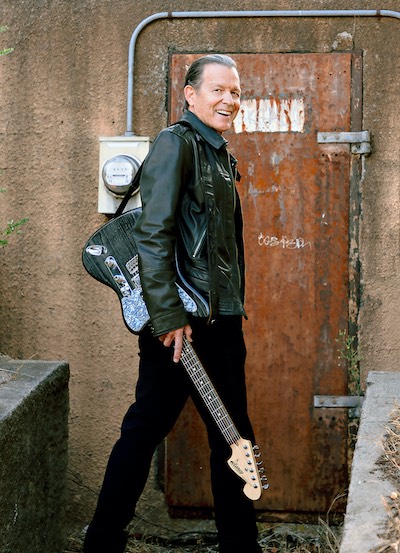
Photo: Tommy Castro by Victoria Smith
By Martine Ehrenclou
Tommy Castro, multi award-winner, blues/R&B/rock & roll guitarist, singer, songwriter, is one of roots music’s most beloved and exciting artists. For blues fans, Castro needs no introduction. Famed not only for his gritty, impassioned vocals but for searing guitar work and innovative songwriting, Castro’s brand of electric blues, funk-infused R&B has captured devoted fans all over the world with his band, The Painkillers.
With 15 albums behind him, Tommy Castro has just released a special project, A Bluesman Came To Town, composed by Castro and Grammy-winner Tom Hambridge, out September 17th on Alligator Records. The roots music odyssey is an opus of sorts, revealing the story of a young farm hand who dreams of becoming a bluesman.
From San Jose, CA, Tommy Castro has earned multiple Blues Music Awards for Blues Male Artist of the Year, Contemporary Blues Album of the Year, Band of the Year (with The Painkillers), and B.B. Entertainer of the Year. This blues star is highly regarded for his electrifying live shows.
Tommy: We’re out here on the road and it’s busy and it’s fun and it’s everything that I remember.
Martine: It must be great to get out there touring again.
Tommy: It is actually, I realize how much I missed it. We’re having a good time.
Martine: I really enjoyed your album, A Bluesman Came to Town. How did you came up with the concept for the story of a young bluesman’s journey?
Tommy: I first came up with the idea to do a sort of a blues opera. And I would say “sort of” a blues opera because I don’t want anybody to get the idea that it’s anywhere in the realm of some of the great rock operas like Tommy or American Idiot or The Wall. Our music is a lot simpler and more straight ahead. But the same idea is what we were going for. I just needed to come up with a story. I decided that I would use the idea of the hero’s journey, because it’s been done a million times and this is my first one, so I’m entitled to use the template. (Laughter)
The story is based on my own experience and some of my friends’ stories and musicians I’d heard about. I made an outline of the story and went to Nashville and wrote songs with Tom Hambridge. I’m always trying to do something different. I don’t like repeating myself or making the same kind of record every time. I like to keep it interesting for me and hopefully for my fans and the band. Tom really liked the idea. It was great because he works with the best in the business. He was excited about doing this project. We’ve known each other a long time and we always thought that we would eventually do a record together. The timing was right.
We put it all together and needless to say, it was a little risky, taking a bit of a chance, going out on a limb. I was a little nervous about it all. When it was all being put together, what came up for me was, “Oh my God, I hope we’re going to be able to sequence this record.” Because normally what you do is you take a batch of songs, 10 or 12 and you take the best rockingest, killingest first three songs, you put those right up front. (Laughter) But this had to be sequenced in a way to tell the story. We really weren’t thinking about that while we were writing the songs. I had been listening to the songs individually and working on them individually. I took a 45/50 minute bike ride and listened to it. I was thinking, “That works, that works. This is good.” And when I finally got to the end of it, all the way through to the reprise, I had a big smile on my face. I thought, “We did it. It works.”
Martine: It does. It’s like a novel with 13 chapters. Is there any of you that’s reflected in any of the songs? “I Got Burned” is about not getting paid for a gig, which I assumed had to have happened. (Laughter)
Tommy: (Laughter) There’s a little bit of me in every one of the songs. Except the actual story about this kid growing up on a farm. I didn’t grow up on a farm, but I could totally imagine that. I had family members that were dairy farmers and I know what that life is like, because we used to go visit them when I was a kid. I would dream about doing something exciting. I didn’t necessarily think it was going to be this, but I was hoping I would find something, some adventure. I grew up in a working class community but that’s glamorizing it a little bit. (Laughter) It was a notch below working class. People didn’t travel much when we were kids. We didn’t go on vacations to different places. I always really wanted to go someplace. There’s a little part of me in there. Laying there at night dreaming about a different kind of life. Like the character.
That song about getting burned–there’s been times when we weren’t sure that we were going to get paid. That’s all part of the journey. Which ones do you want to know about and I’ll try to be more specific?
Martine: I wasn’t thinking about particular songs that might be a reflection of you. I was thinking about the whole storyline, of falling in love with the blues and R&B and being on the road, only to awaken to what’s truly important and then cycling back to what’s meaningful.

Photo: Tommy Castro by Victoria Smith
Tommy: That is definitely my story. When I was younger getting into this, I liked to have a good time. And that was really fun and exciting and I loved to play. It was about the excitement of having some success and being able to make a living playing, doing what I love. As life went on, I took a few beatings along the way. Sometimes you have to come back to the drawing board and go, “Hey, what is it all about, what do I really want, what is important?” Yeah, I’ve gone through all of that stuff personally.
Martine: Tell me about the song, “Hustle.” I really love it– it’s so funky and fun.
Tommy: “Hustle” I love. Nobody asks me about that song, by the way. That’s possibly one of my favorite moments on the whole album.
Martine: You seem so at home on that song. Down to when you sing, “Woo.” (Laughter)
Tommy: (Laughter) It’s no secret I’m a big fan of James Brown. That’s the influence behind that. I remember telling Terry Wilson, my writing partner, that I was going to be doing something like this. But it wasn’t necessarily what we were shooting for. The idea is, you’re hustling but you don’t want to hustle all in one place and wear it out. You’re better off spreading your hustle out. I was having a hard time figuring out what to do with the lyrics on that. Then I just came up with that funky groove and then sort of talking. Somebody referred to it as rapping. I don’t think that’s rapping.
If I was going to rap, I’d have to do a lot better job of it. (Laughter) I like good rap music. That’s not what I was doing, just talking through that part of the song. And that felt right.
Martine: It seemed to me that you and the band were having a blast on the song. The horns, your guitar solo. Everything about it seemed to sync perfectly.
Tommy: The saxophone parts were done by my new life partner, Deanna Bogart. We had the tracks and we didn’t have the horns on them yet, but I thought to myself this really needs a saxophone part. Her and I worked out what the parts might be. We went into a little studio down in Palm Desert. She just knocked those horn lines out and took a little solo section. She has her own solo career–she plays piano, saxophone, sings, writes songs, has made quite a few records in her life. It’s nice to have a great saxophone player in the house. The other saxophone song later on in the record was done by my old saxophone player that was full-time in our band for 20 years. Keith Crossan. I think our fans will be happy to hear him again on one of our records. He’s a good friend.
Martine: I have seen you live and you’re a wonderful performer. Have you always felt that comfortable on stage? You seem very relaxed, having a good time. Has it always been like that?
Tommy: No. (Laughter) I was scared to death. (Laughter) Still am. I hide it real well, but I’m real nervous on stage. Because I’ve never been one of these over confident people. Some people just walk around and they’re super confident. I always wanted to be like that. I kind of lean the other way. I have worked on that in my life, in my own growth, to be more realistic about my talent and my abilities and who I am as a person. I have a tendency to put myself down and try to be humble, overly humble. Humility is a good thing, but you don’t want to walk around saying bad things about yourself. When I grew up, people didn’t brag about themselves. I was taught that you didn’t do that. I was always the opposite of that, to the point where it’s probably not good for me. Because all that self-talk, you hear yourself saying these things and you might wind up believing it.
I really wanted to play in bands, and I knew that I was going to have to get over that. When I first started performing, I would stand in one spot. I didn’t move around much. I didn’t look at people. (Laughter) I just played my parts. As time went on, I wound up being the singer. And when you’re the singer, you’re the guy with the microphone. You have to talk to these people. (Laughter.)
Martine: (Laugher) How did you learn to do it? Overcome the nervousness.
Tommy: That’s an interesting little side story here because I listen to a lot of live records. I have been criticized in the past for speaking the way I do on the microphone. I learned from listening to Albert King and James Brown, B.B. King, Jimmy Reed, and people like that on their live albums. These are all old black men. So, I stand up to the mic, I would say the same kind of things that they said. And people were always asking me, “Where are you from?” And I would say, “I’m from San Jose, California.” And they go, “No, you’re not.” (Laughter)
Martine: (Laughter) That’s very funny.
Tommy: It is funny and it’s hard to break. It’s who I am now. That’s my stage personality and it is really who I am off stage too. There was a little bit of a rude awakening when I realized that people didn’t necessarily get that. I learned how to play guitar listening to records, I learned how to sing listening to records and I learned how to speak to an audience listening to live albums. It really wasn’t a conscious thing, it’s just that I did what I knew. The kind of things that I heard that I liked.
I just hide whatever nervousness or insecurity that I have the best I can by just trying my best up there to make sure I give a good show. Sing well, play well, select the right songs. Lead the band. There’s a lot going on up there. It’s a lot of work. (Laughter) A lot of things to keep track of and I try really hard. But then the other thing that I learned was I always try to keep a smile on my face, because everybody thinks it must be going well when you smile. (laughter)
Martine: (Laughter) Is there ever a point during your show when you forget about feeling nervous?
Tommy: Once I’m off to a good start, then I can relax a little bit. I’ll tell you a funny story. One time early on, we were opening for Robert Cray. Big house. It was one of the first times we were really in a good gig, on a big stage and everything was just clicking along. And I had that moment, I thought to myself, “Yeah, I’m bad.” (Laughter) I thought it just for a second. And then I tripped over the monitor speaker and fell on my butt. (Laughter)
Martine: (Laughter)
Tommy: (Laughter) And I knew that was God, or the universe or somebody was going, “Just calm down Mister.” That was the last time I ever entertained that thought at a gig.
Martine: You didn’t bring on The Painkillers for this. How come?

Photo: Victoria Smith
Tommy: It was because of working with Tom. He was okay with using my band, in fact that was the original idea. I told him, “You know I always record with my band, I hope you’re okay with that.” He goes, “Yeah, we can do that. I prefer to work with my guys because we do this together all the time and we have a formula and a system that works great. And it gets done well and quickly. But if you really want to use your band, we can do that.” That’s where we left it for a little while. Then as I started imagining this record coming together, I thought, “I don’t think I should tie Tom’s hands by making him work with a band in the studio that he’s never worked with before.” Just this once I think I’m going to go down to Nashville and work with Tom and his guys. I had to break the news to the band and they were all very understanding and supportive. Then I found a way to bring them in a little bit on some of it. In a nutshell, I wanted Tom to do his best work with me on this record and I thought that was the best way for him to do it.
Martine: You’re guitar playing on this album was stellar. Did you play everything on the Delaney guitar?
Tommy: I use mostly the Delaney. I have a Stratocaster that I use. Not my old Strat, but I used a modern Stratocaster on a couple of songs. Then I used a Firebird on the slide stuff. And then an old National that I had that belonged to a friend of mine who passed away.
Martine: Did you use the National on “Somewhere, the Reprise?”
Tommy: Yes.
Martine: It’s a beautiful song. Were the lyrics a little different in the Reprise?
Tommy: Yes. Thank you. It’s the same song, slightly changed the lyrics, because now he’s gone back home. Before he was trying to leave. That’s how the story comes full circle and he realizes that everything he was out there trying to find and do, everything that he really wanted, he already had. That was the treasure that he found.
Martine: Have you found the same treasure? Not in the same circumstances obviously.
Tommy: Yes. With me, it’s my kids. I have four grown kids. Two or three different relationships and wives in the past and I’ve remained friends with all of them. But the relationship with my kids it’s always there. It’s the most important thing. My youngest daughter just got married.
Martine: Congratulations. How was that for you?
Tommy: It was a fantastic wedding and it’s the third one of my kids to get married and the third time I’ve played the wedding. (Laughter)
Martine: How fun. That must have been a thrill for her, and everybody.
Tommy: They wanted me to. It was so much fun. Oh my God, it was fun. It’s the third time that I’ve played my kid’s wedding, and at their request. I never suggested it. They always just said, “We hate to ask Dad, but we’d really like you to play if you could.” You bet, I’m there. The important thing to me is to be a good dad and be a good person and to be there for them, whatever they need. Which is why I don’t have any money. (Laughter) But I don’t care.
Listen to “Blues Prisoner”
For more information about Tommy Castro see here

Tommy is a gem of a guy! Super talent, super nice guy.
Caught Mr. Castro at a benefit for underprivileged elementary school kids for Pajarjo School District in Watsonville CA, I think he was around 18 maybe. He was ripping hot then and have been a fan since.